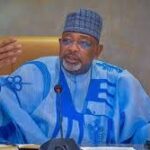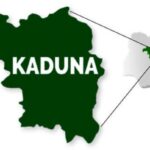
Aishat Oyebode nee Muhammed is the first child of the late General Murtala Ramat Mohammed who was assassinated barely seven months after assuming office. A lawyer by profession and Chief ExecutiveOfficer of Murtala Muhammed Foundation (MMF), Aishat in this interview reflected on a number of issues relating to the late military leader and how the family has had to forge on after his death.
May we know more about Mrs Aishat Oyebode?
Well, I am the first child of the late Murtala Mohammed, the first of five children. I am a lawyer by profession. I have a master’s in International Law from Kings College, University of London and one of my specialisations is Laws of War. I also have an MBA in Finance from Imperial College, University of London.
How old were you when you father was assassinated?
I was 12 years old at the time while the last child was barely six months old.
Casting you mind back to February 13, 1976, what will you say really transpired?
Well, as much as I try to remember what transpired that day, I need to say we really didn’t know what happened because we were prevented from knowing. We were only told three days after. That was when we got to Kano and the story was broken to us by our grandma. Of course, I have always had my suspicion.
Although on a Saturday, that was February 14, I saw some headlines in the newspaper but it was still not clear to me. We were also not allowed access to radio and television.
So what happened when you eventually got to know?
I was devastated. I was very very, devastated. This is because I was so close to my father, despite being just 12 years at the time.
Will you say your mother had any idea if his life was in danger at anypoint in time prior to his assassination?
Well, I remembered that the day he became Head of State was actually a sad day for my mum. I was not around that day but when I came in, I saw her crying and when I asked her, she told me that my father has just been announced as the new Head of State. And she said: “I’m afraid for him”. So I’m sure if she had any trepidation, then it must have been from that time on.
Knowing that Lt-Col. Buka Suka Dimka led the mutineers that killed your dad, has any member of your family met with any of the Dimkas?
I really don’t want to talk about it because a lot of water has passed under the bridge. I think what is important at this point in time is healing. So I don’t want to talk about that.
What did it feel like when after the assassination of your father, you were taken out of Dodan Barracks?
No, we didn’t live in Dodan Barracks. We never lived in Dodan Barracks. All the while, we lived in our own house.
How will you say those in the military at the time treated your family after the assassination?
Honestly we didn’t have any interaction with those in the military. There was no basis for any interaction. So I don’t think I can complain about how they treated us. I think for anything, some of my father’s closest friends in the military were very good to us.
Including General Olusegun Obasanjo?
Yes. He did okay. I think if there was any challenge, it was later in the year, in terms of payment of school fees. My sisters almost had to leave school. So we had those challenges much later.
Life was really tough and of course financially it was difficult. But what this does is that it makes you resilient and very strong. It also helps me to understand what it is like when people are going through a difficult time. I am fortunate because my mother focused on giving us good education. That has helped me a great deal.
What is the feeling when people get to know you are the first child of the late General Murtala Muhammed?
Well, it has been quite interesting and people seem to always be excited at such discovery. There are so many people who have walked up to me and said, we so much appreciate your father. We admired him and all that. Some will come and say, I have read quite a number of books about him, and all of that. It’s been quite humbling.
One of your younger siblings died some time ago, what will you say was the cause of his death?
Well, we really don’t know. He was actually travelling to Abuja when he died. That was in 1993. They said it was an accident but we weren’t that sure. He was in the company of his friends. One of the boys in the car and the driver were arraigned, then they were later detained. We do know that at one point they were later released. And all of the documents and evidences later disappeared.
This is one reason the Murtala Muhammed Foundation is fighting for victims’ rights. We believe that when victims have established rights, such things can no longer happen.
Talking about your father’s cenotaph at Ikoyi, we understand Ikoyi/Obalende Local Council is handing it over to your foundation.What do you intend to do with it?
Giving it over to us was a very recent thing. I think the letter was dated two or three weeks ago. We have been talking to them for a while and at one point, they agreed they would let us have access to it, but they have actually just handed it over to us. So what we are going to do is to design it into a befitting memorial. I am sure by this time next year, we would be talking of a totally different cenotaph. It would be a proper memorial.
What other things do you want to achieve with this foundation?
There are many other things. What we actually wanted to do is actualise the ideals of our late father. We have a lot of programmes – education, capacity building, what we call political and public advocacy and that includes for example, some of the things we are doing in the North-East and with the IDPs (internally displaced people). We are also looking at how we can build a robust framework for humanitarian response for the whole of Nigeria.
We are working with the Ford Foundation to develop a robust framework for humanitarian coordination mechanism for Nigeria. And then we are also looking at, in partnership with the National Security Adviser, the issue of building a framework for post-traumatic stress disorder.
When your father was assassinated, he was only with his driver and ADC. Would you advocate that the attraction in public office be reduced to remove the desperation to occupy public office?
Yes, public service has to be about service. We need to change our orientation. It cannot be about fanfare and excesses; it has to be about service. This is why I always advocate that elected public servants shouldn’t be allowed to go abroad for healthcare; they shouldn’t be allowed to take their children to schools abroad because it is about sacrifice. If you cannot live a life of sacrifice, how do you expect to tell the people you lead to live lives of sacrifice?
Your father was known as a man of intellect, he was credited for his excellent use of grammar, how would you describe his intellect and the kind of education he had?
My father was an intellectual. You know he went to the Royal Military Academy Sandhurst in the UK and I think he would have gone much further. He grew up believing in himself, because his father died when he was young – he was in primary school and it was very difficult getting people to support him in paying his tuition right from primary school. As a soldier, he developed himself a great deal.

 Join Daily Trust WhatsApp Community For Quick Access To News and Happenings Around You.
Join Daily Trust WhatsApp Community For Quick Access To News and Happenings Around You.


